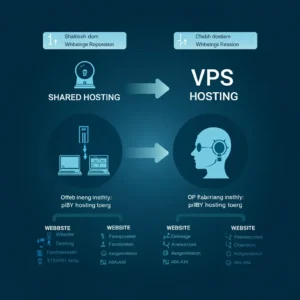Introduction to Shared Hosting
Shared hosting is one of the most common types of hosting used by startups and small websites due to its low cost and ease of use. In this type of hosting, several websites are hosted on the same server, sharing its resources such as processor, memory, and storage space, making it a suitable option for websites that do not require huge resources.
1. What is shared hosting?
In shared hosting, a single server is divided among multiple users. Each user gets a certain portion of the server's resources to host their website. This system is similar to renting an apartment in a large building, where all the residents share common facilities but each has their own space.
This image shows how multiple sites can run on a single server together, sharing resources without directly affecting each other's work.

2. Advantages of Shared Hosting
Shared hosting is a very economical option for small websites, costing much less than dedicated server hosting or cloud server hosting. Other benefits include:
- Low cost: Shared hosting allows you to host your site at a fraction of the cost.
- Ease of use: Most shared hosting companies provide an easy-to-use control panel.
- Technical support: Companies often provide technical support to help you if you run into any issues.
This panel shows a simple interface used to easily manage your site, and is often included in shared hosting plans.

3. Disadvantages you may encounter with shared hosting
Despite the benefits of shared hosting, it does come with some challenges, including:
- Restriction of resources: Since you are sharing resources with other users, this may cause your site to slow down when the server is overloaded.
- Safety: Although companies work to secure servers, sites hosted on a shared server may be vulnerable to security risks.
- Limited performance: When the number of visitors on your site grows exponentially, it may be best to upgrade to higher hosting to meet your needs.
Here you can see the impact of high utilization on resources, as site performance suffers as the number of active sites on the server increases.
![]()
4. When should you upgrade from shared hosting?
Shared hosting is excellent for small websites and personal blogs. But when your traffic grows or your applications require higher resources, you should consider upgrading to VPS hosting or a dedicated server. These options will give you more resources and better performance.
This image illustrates the transition from shared hosting to VPS hosting, where you get more dedicated resources which improves the performance of your site.

Conclusion
Shared hosting is an ideal option for websites that are just starting out or don't require huge resources. It offers a good combination of affordability and ease of use, making it a popular choice for many webmasters. However, if your site is growing and needs more resources, upgrading to another type of hosting may be the next best step.
By choosing shared hosting from a reliable company, you can start your website building journey with minimal costs, excellent technical support, and an easy and convenient hosting experience.


